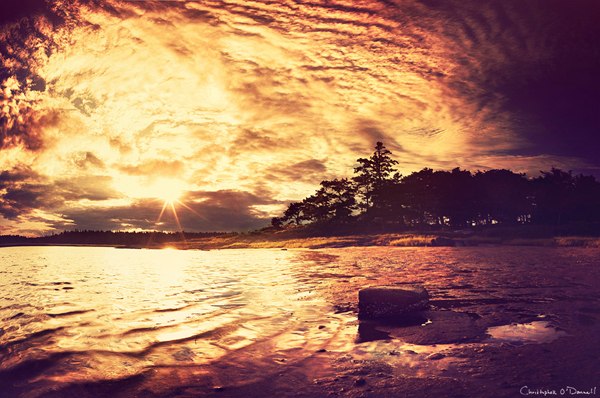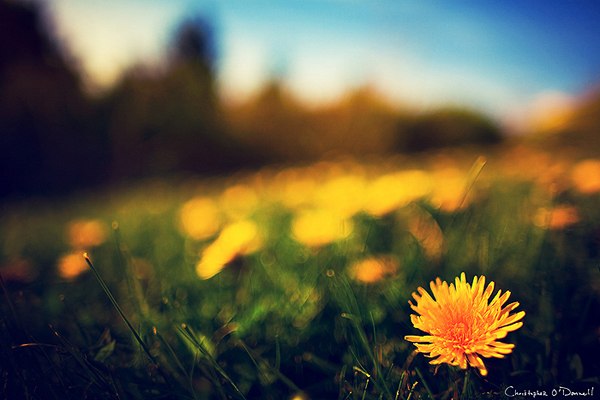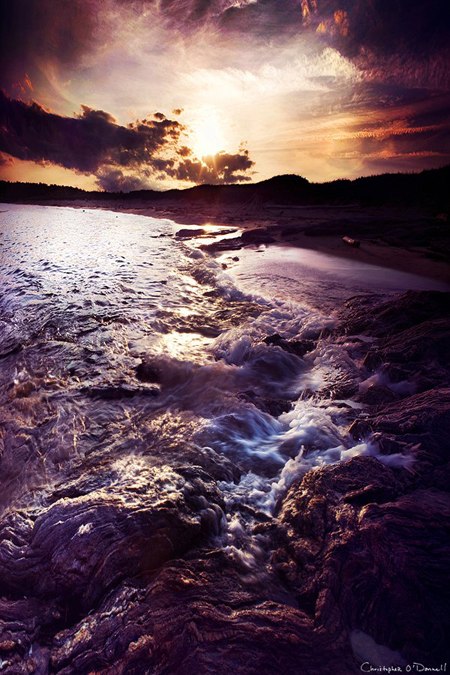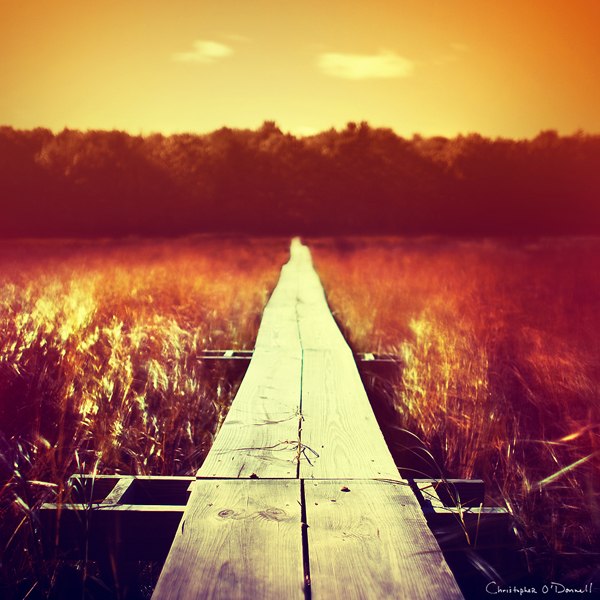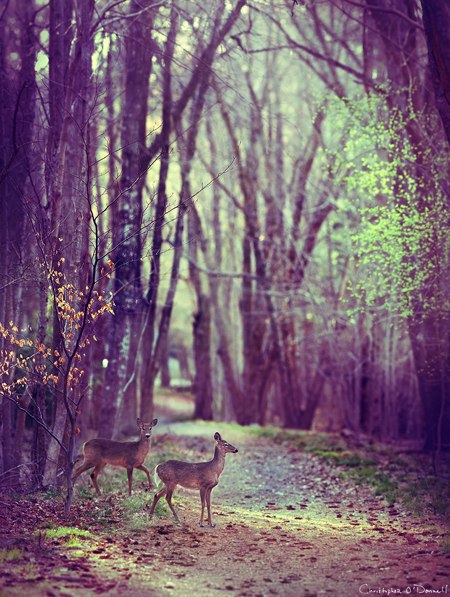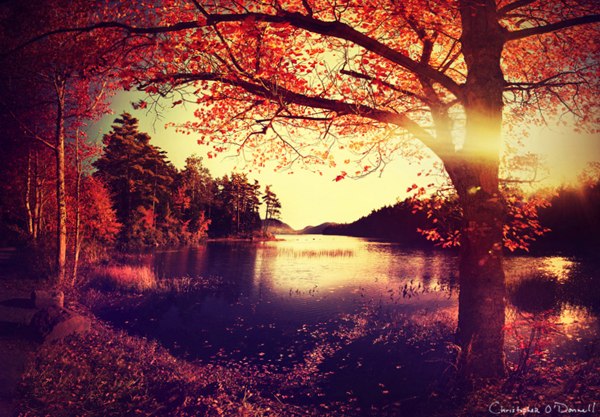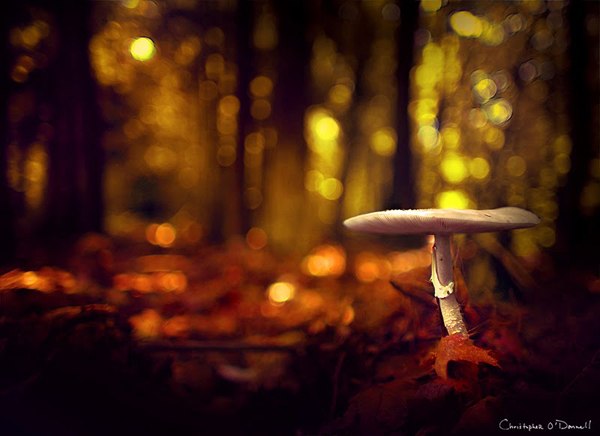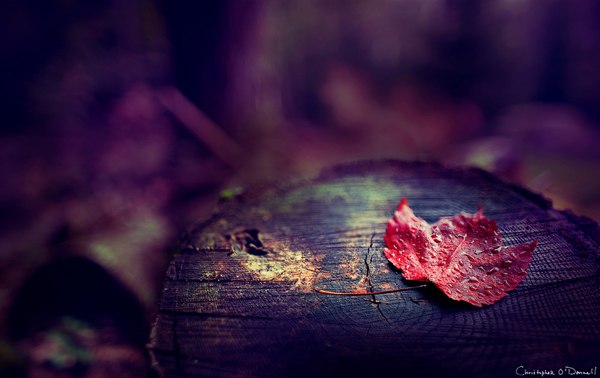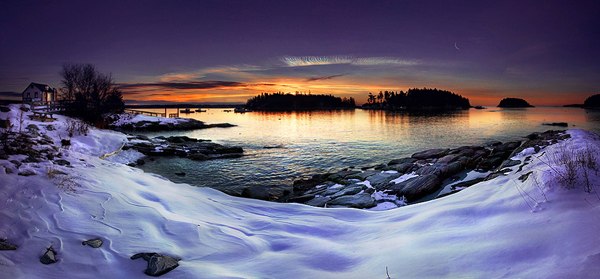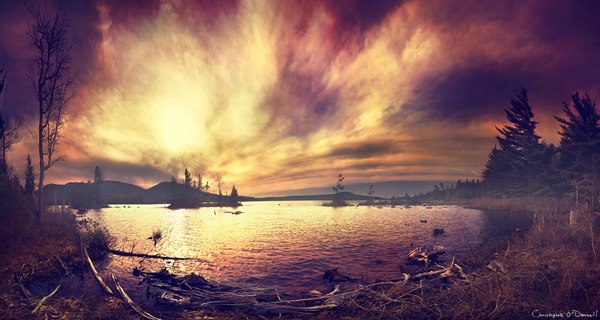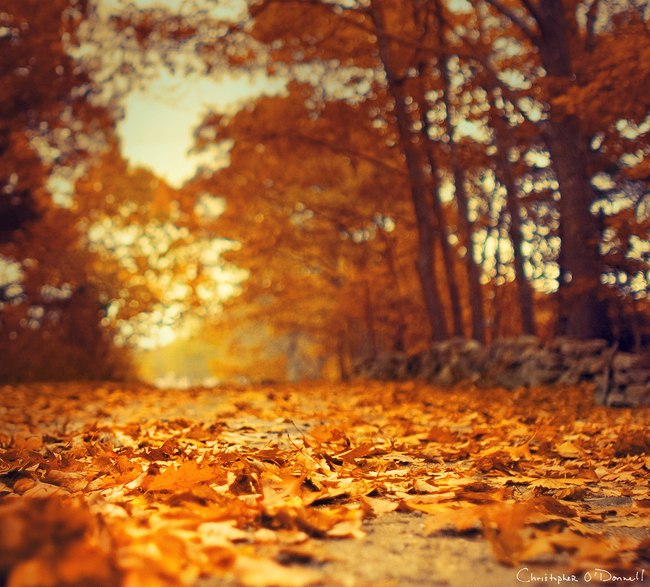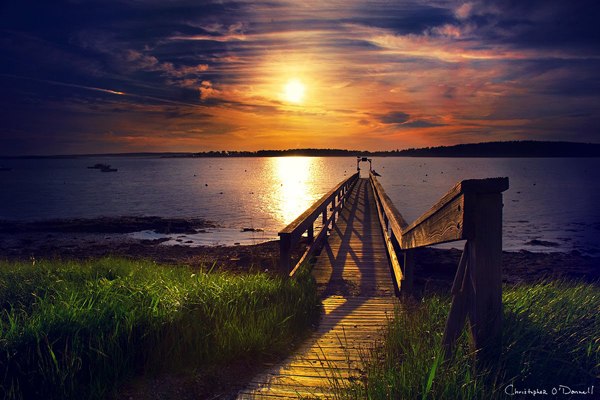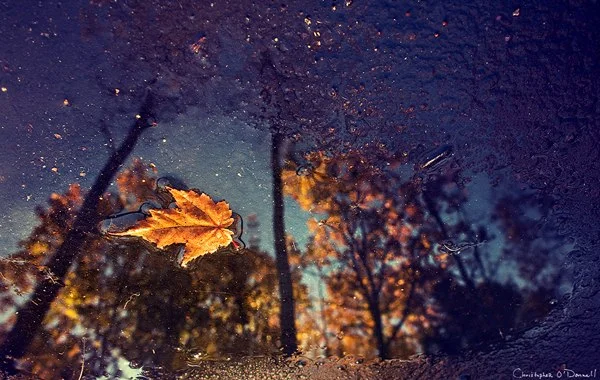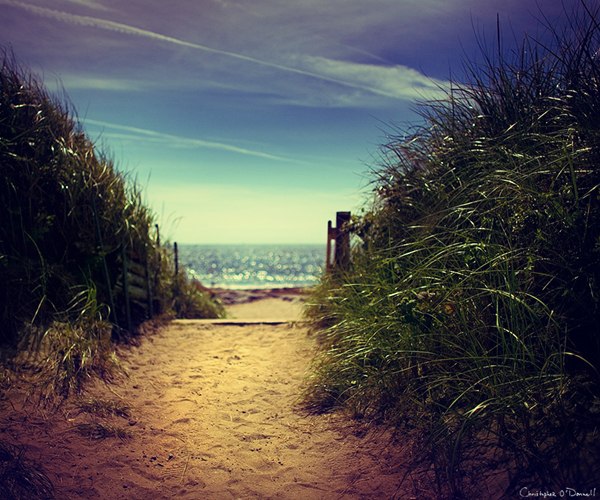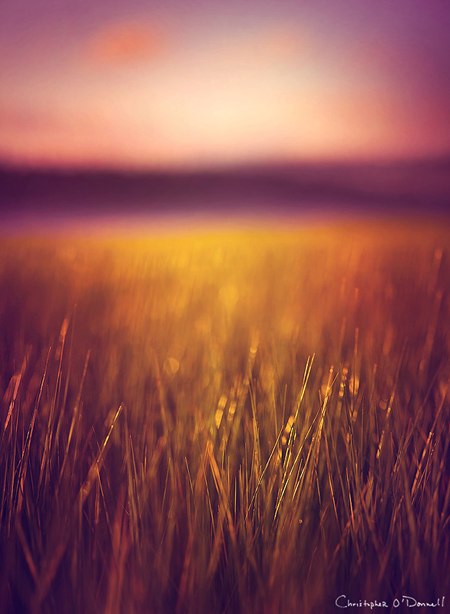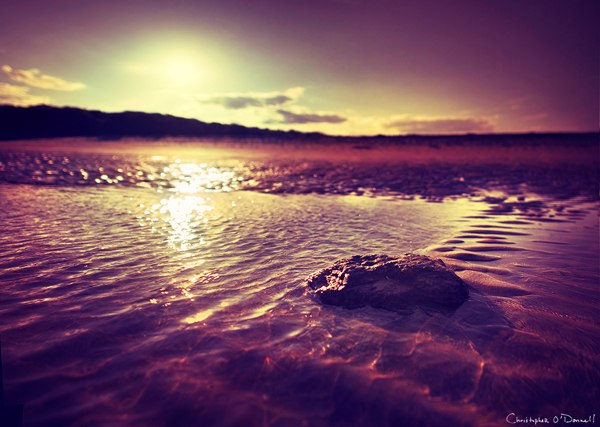Landscapes from the Untouched Country: The Photography of Christopher O’Donnell
Spring © Christopher O'Donnell
Christopher O’Donnell is a landscape photographer who has lived and worked near the coastlines of Maine for the past few years since leaving college. While he does shoot subject matter beyond what he has built his reputation on, his primary focus, his gift, is—and will remain—the ever-changing and breathtaking landscapes in and around Maine. One thing that his fans have noticed-and he touches on it briefly in the interview we had below—is that even when he shoots in the same location, no two images are ever the same. More so than that, each image he captures has its own life, its own personality, and its own powerful dynamic.
Each photograph is a separate world unto itself. As he continues to build on his impressive body of work, Chris has also incorporated writing on photography—he has an e-book in the works now—and teaching other photographers through his private lessons and tutorials. Landscape photography may be a conventional genre of photography, but Chris continues to show just how unpredictable nature can be in all of its subtle yet glorious states.
Before I start, Chris, I want to say thank you. I’ve seen your work before, and been a fan for a few years. It’s an honor to me that you would welcome the opportunity share some of your thoughts with not just me, but the readers as well. What are your earliest memories of being drawn to photography? How long have you been shooting?
I always loved photography just like anyone else. My mom took a million photos of me growing up so I was always around a camera - she definitely was my biggest influence. And she always knew how to make me laugh for a photo, so I quickly associated fun with the camera. I began to really “shoot” in 2008, after I took an intro course to black/white photography in college and bought my first digital SLR. It took me another year to settle on landscapes, and have been pursuing that exclusively since then. Up until that intro course, I always loved photography but didn't know the first thing about manual settings or how to use the camera, so it was a true awakening for me.
What kind of training or experience have you taken on to develop your skills with the camera?
I love answering this question because I like to show that you can reach a certain level of satisfaction with your work without going through the conventional channels of training and education – and you can have fun doing it too.
I stumbled onto photography my senior year in college, and only because studio art was my minor, and I needed to take three art classes that semester – black and white film being one of them. For me, it was essential to have this class because it taught me the basics without getting bogged down with the technical aspects of digital....I learned about lighting, tones, aperture, shutter speed, grain – it gave me a solid foundation.
From then on, I was completely self-taught. I would go onto photography websites and blogs forums, picking out landscapes that really stood out, and would try and figure how it was made - what in-camera techniques were used, what was the post process workflow, etc. It's been a little under four years since I settled on landscapes, and my work is still evolving and changing today.
On your website, you state that Maine is the “perfect landscape” Would you mind giving a little more insight into that, and describe just what makes Maine the ideal place for a landscape photographer?
Absolutely. I first discovered photography while living in Vermont, which is one of the most inspirational places to live if you want to appreciate landscape photography. However, having grown up just north of Boston, I really missed the ocean. So I decided that Maine would be the perfect place to go - the rocky coastline, mountains, the ocean and the lakes all in one state. My favorite part about Maine is the coast, where you can live in a small town and still not capture every unique and breathtaking spot since there is so much variation on the coastline here. I also like the absence of big crowds – even during the height of tourist season in Bar Harbor, I still find it easy to slip away for a landscape photo in solitude.
Have you got any plans, long-term or short-term, for your work? How do you keep challenging yourself to keep your work inspiring and feeling fresh?
I have quite a few plans for the upcoming summer. My main focus will be my tutorials since they seem to have helped a lot of other photographers. I've been in the process of writing my first ebook about my photography, specifically to help others develop their own unique style. It's near completion and I can't wait to share it with you all. I also plan to spend the entire summer in Acadia National Park, and photographing the coast.
Complacency with your work is something you can easily fall into, and challenging myself with a new process, a new subject, or some new gear is key to keeping my work “fresh”. For example, right now I've been almost exclusively shooting panoramas which are autobracketed and then blending manually, which is a very involved and complicated process – much different than my work from a year ago. I'm having a lot of fun with shooting landscapes in this format – encapsulating a 180 degree view into one image, and then blending the different exposures using layer masks.
What inspires me the most is the landscape here. It's ever changing – season to season, the different natural lights, new perspectives....I can shoot the same location twenty different times and come out with a unique photo that I never got before. While I don't publish every photo I take (actually, I end up passing over about half my work), I always learn something new from a shoot which is so important to me.
Obviously, your focus is landscape photography. What else do you photograph outside of that?
I started out with macro photography, so I thoroughly enjoy that from time to time. When asked, I will also do select portraits or property photography...but I don't include that in my professional portfolio or advertise those services – those usually come from existing personal connections who want to work with someone they already know. I'm happy with landscape photography and keep to that – except when my two labs are doing something funny.
There are obviously differences in the needs of clients and customers between landscape photographers and portraiture photographers. What have your experiences taught you about that?
My experience has taught me that landscape clients are usually already familiar with your work and enjoy it, while those who are looking for portraits may only know you from a reference – hence the need to “sell” yourself. So I tend to spend less time on advertising and marketing than if I was in the portraiture business since clients have already seen my work and liked what they saw – my work tends to sell itself with or without my input.
My entire client demographic can be put into three categories – either they are looking for fine art prints, would like private lessons, or need something editorial (rights to an image, an article on landscape photography, etc).
I am always inspired by landscape photographers who use their expertise in that field to also do portraits, combining the two. Alexandre Deschaumes does this very well, and when I do have a portrait client I will almost always bring them into the landscape and make that the environment vs. shooting in a studio.
I know that even as a photographer for quite a few years myself, I like to hear how my peers work and what their process is. They say its never too late to learn new ways to do things. Can you offer a glimpse into your process? How do you approach a shot, or a shoot, from start to finish?
I really love this question because most people ask me strictly about my editing technique. I usually know where I'm going before I set out to shoot, but rarely do I know exactly what I'm going there for – and when I do, it often changes depending on what I find when I get there. And when I do leave for a shoot, it is often not planned in advance – usually when I see nice light outside, I pick a place and just go.
When I find a scene that strikes me as unique, I start looking at the perspective. This is what I spend the most time on, and I always take my time until I find a vantage point I really enjoy. I almost always use my wide angle lens (24mm f1.4), so I need to take that into consideration when searching for perspective as it exaggerates all the distances.
Then I decide what I'm going to do – if it's a sharp panoramic with a deep depth of field, or a bokeh-filled photo taken with a wide aperture. Recently I've been going back and forth between the two.
My favorite kind of light to shoot in is the early morning or late evening, which is typical for most landscape photographers I think. Bokeh during this time is in prime form. I also enjoy soft, natural lighting – whether it's from overcast clouds or during the twilight hours. It really brings out an intense, powerful tonal range, especially during the starkness of winter.
Generally speaking, what does your editing process look like?
Contrary to what most think, my editing process deals strictly with tones and colors – which can take a few hours to perfect. I don't have a “typical” editing workflow. I pick a color palette that I think will work well for a photo and just go with it and see where it leads me. I dodge and burn to bring out certain areas of interest, and use many, many layers. I think that is the most important part of my editing process – using many low-opacity layers of colors and tones, and I will almost always use a layer mask on each one so that the blend together nicely.
This all assumes that my photo is ready to go straight out of the camera, which it is often not. I will typically spend a few hours putting a photo together with pano-stitching software, and then go through the exposure blending process – it's like HDR, but doing it manually through multiple layers with masks vs. automatically with third-party software. I like having the added control over my image that exposure blending provides, and it's always nice to have the option of going back and tweaking those blended layers, which I sometimes need to do.
From start to finish, I typically spend 4 to 8 hours on a single image in post process.
What kind of guidance or encouragement would you give to other photographers out there, whether they’re aspiring hobbyists or budding young professionals, or just someone with a new camera and an imagination?
The part of my photography that has been the most grounding - and the most consistent - is to find balance in whatever area you are in, and don't be afraid to switch gears when something is not working. You can take this as general or as specific as you want. Balance could mean finding time for both photography and your work schedule, or finding balance between photo editing and shooting in the field. When you start spending too much time on one thing and neglecting others, things get off balance and frustrating - and this can show in your work, which only adds to the frustration.
If you get into this kind of slump, stop and analyze your workflow and how you spend your time, and restructure your priorities. Doing this every so often, even when you don't think you have to, is incredibly refreshing.
Also, don't get pressured into doing something you're not ready for, and don't make commitments when you have limited free time for actual shooting. This falls into the “balance” of things where you're spending a disproportionate amount of time on other things related to photography (marketing, social media, etc.), but not actually ON your photography.
And always remember: photography is supposed to be fun. If it isn't, you need to stop and figure out when things changed and how to get back to the fun part. Your instincts are your best friend, so if something feels “off” or just isn't working, don't ignore those signs – breaks are a good thing and can help you prioritize and refocus, so always remember that you can take one.
